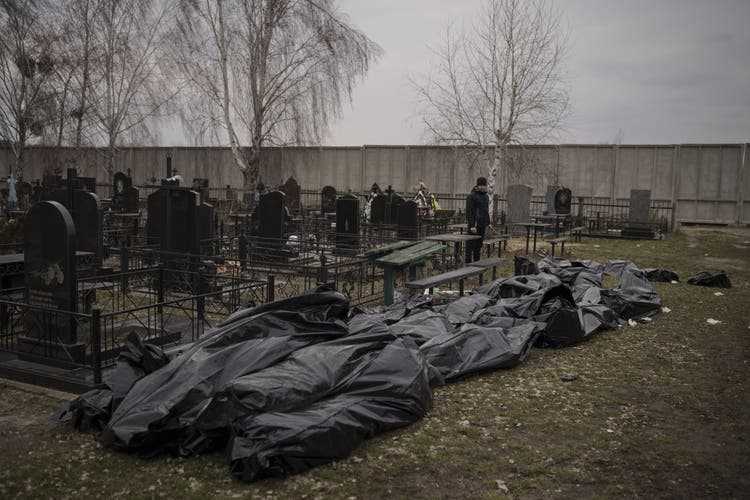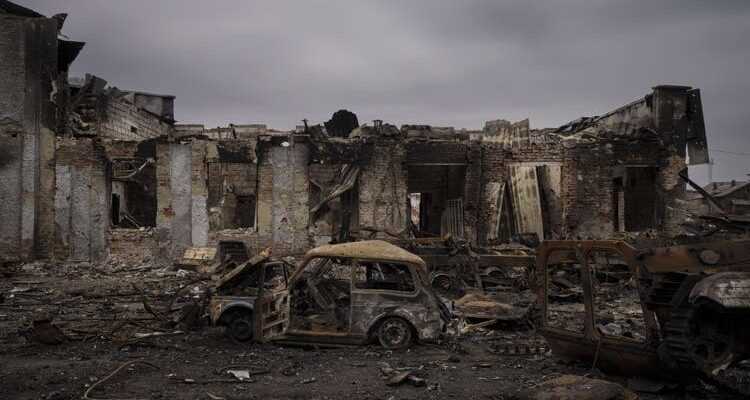The flood of news and images about the war in Ukraine is hard to bear. It leads to verbal errors in some observers. The strongest expression is not always the right one.
War ruins in Trostsyanets after recapture by the Ukrainian army.
This is not about the war of words with which the hostile powers have always accompanied the war with arms. It’s also not about the invaded Ukraine using every means of persuasion to mobilize necessary help in the West.
This is about how independent media, responsible politicians and enlightened citizens speak about the terrible events in our neighborhood. Talking about this war presents difficult challenges for all of us. The events of the war are being followed in the media almost in real time like never before. Nothing seems to escape us: the demolition of the cities, the destruction of attacking tanks, the brutally murdered civilians.
This arouses anger, fear and pity. And it leads to excessive use of words. In its morning newsletter, Der Spiegel fears that the massacre in Bucha is just the beginning. Because Russia is leading a “campaign of extermination”. Is that correct? Historical science understands the term as a strategy with which a country is not only conquered, but its population is murdered and expelled.

Bodies of murdered civilians packed in sacks at a cemetery in Bucha.
The historical point of reference is the German attack on Poland and the Soviet Union with the order to enslave and destroy the Slavic “subhumans” and to create “living space” for the conquerors. The Wehrmacht was followed by the “Einsatzgruppen” who systematically killed the Jewish population. As a precautionary measure, Hitler had protected the perpetrators from prosecution with the “martial law decree”.
What exactly is genocide?
The murder of European Jews was a genocide. Is something similar happening in Ukraine today? The widespread attacks on residential areas and hospitals are indeed war crimes. They probably constitute crimes against humanity and are now being investigated by the International Court of Justice. According to the UN Convention, genocide is only present if killings are committed with the intention of “destroying a national, ethnic, racial or religious group as such or in part”. The decisive factor is the motive for the crime, which can only be determined by a meticulous procedure. The court came to this conclusion in the mass murders of the Tutsi in 1994 and of the Bosniaks in 1995.
It is at least thoughtless when NATO Secretary General Jens Stoltenberg (according to “Spiegel”) says that in Ukraine we are witnessing the “worst atrocities in Europe since the Second World War”. He seems to have forgotten the Yugoslav wars, which claimed the lives of more than 130,000 people and forced millions to flee. There, too, cities were completely or partially destroyed (Vukovar, Mostar, Sarajevo). The genocide was followed by the «Urbicide». The aim here is not to endorse the now widespread victim competition. But evaluating the horror also requires a sense of proportion and judgement. The fact that the Yugoslav wars are often ignored is mainly due to the fact that the West was not afraid of Milosevic. But before Putin, yes.
Accuracy in expression is important
A few days ago, an ARD editor spoke of “suspected war crimes” with regard to Butscha. He was immediately attacked on Twitter and denounced as a “presumed journalist”. The attacked made it clear that he would only describe the atrocity as a war crime once the course of the crime had been determined. He could also have made it clear to his critics what the word “presumably” means. According to Duden, namely “to all appearances” or “probably”, but not “maybe” – and not “undoubtedly”.
